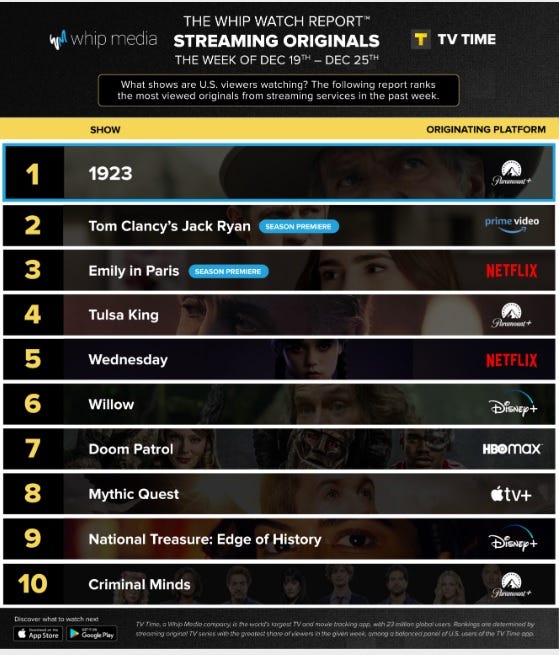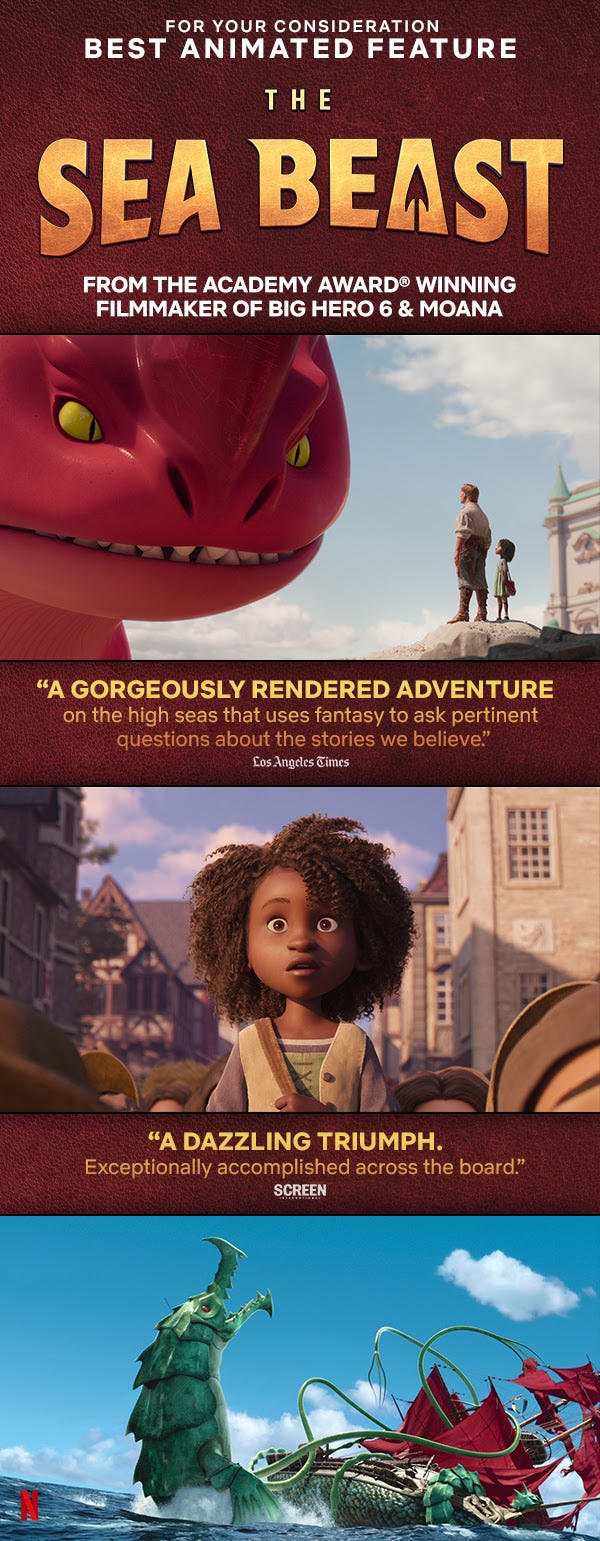Here's everything you need to know about the world of television for the slowest week of the year in the world of entertainment.
PROGRAMMING NOTES
Just a reminder that this newsletter is the only one you'll receive this week, since pretty much everyone in Hollywood who could take off for the post-holiday week is doing so.
I'll be returning to my regular Monday through Friday daily schedule beginning on Monday, January 1st (next Monday).
2022 has been a fascinating ride and I am looking forward to seeing what the New Year brings. This newsletter in particular has proved to have much more in an impact than I might have predicted. I think in part because I'm older and not based in the Hollywood/NYC axis. So my perspective is a bit different than what you might see in one of the trades or big publications.
That point was driven home this morning when I heard from a top executive at one of the major streamers, who is interested in speaking to me on background about his company's strategy and plans for the upcoming year. This person mentioned several recent newsletters and how they felt I had been unfairly harsh about some of their recent decisions. The fact they feel the need to reach out and give me a briefing is a good reminder of how far this newsletter with nearly 40,000 subscribers can reach. I suspect that is also the reason why you're starting to see a few industry ads - like the FYC ad that is in today's issue.
TooMuchTV will remain free to everyone in 2023 and I would encourage you to share it with anyone you think might find it useful.
But if you have the ability and would like to show your support in a more tangible way, there is a paid subscription option, which helps make this newsletter possible.
If you are interested in upgrading to a paid subscription, this 30 percent off deal for the life of your subscription runs through the end of the year. And for those of you who are already a paid subscriber, you'll receive the same offer when your current subscription runs out. I won't be offering this deal until next December, so take advantage of it if you're interested.
HOW FEAR CAN IMPACT PR AND CORPORATE MESSAGING
I spent some time as a financial reporter and at one point my beat included doing CEO interviews during earnings season. Every three months, I would spend two weeks doing six or eight interviews a day with CEOs whose companies had just released their latest quarterly earnings numbers. And one thing I quickly learned was that as much as they wanted to get their message of choice out to investors, they were more concerned with saying something that could be seen as negative or controversial. Their PR people worked with them for days ahead of time to make sure that whatever question they were asked, whatever subject might come up in an interview, they could stay on message.
That's an even bigger issue in the entertainment industry, where a fear of accidentally creating some click worthy story is an overriding concern for publicists and network communications people. This quote from a "marketing/PR executive" is a reminder of why it can be so difficult to convince executive and major stars to agree to an interview:
There's also, because of the way that media works, a lot of risk with doing press now. So you have to be thinking about how to market a film, or a television show, or a person without putting them in a position of being at great risk. Because you could do 90 percent of the things right, and end up in one bad situation with one person just trying to get clicks, and just that one answer travels the world in two hours and ruins the entire thing. So that's been really, I think, interesting. Because I'd rather just not do it. Find other ways to engage.
This fear of inadvertently creating headlines might make a lot of sense from the standpoint of crisis management. But sometimes you can solve a lot of problems by getting out there and arguing your case in public.
One of the major news stories this week in the world of streaming centers around the size of the audience for the Netflix movie Glass Onion. The viewer estimates for the film's premiere streaming week appear to be okay, but not record-breaking. Which could be a problem for a film that cost a reported $200 million (or more).
The viewer numbers have already spawned a number of "this is a big disappointment for Netflix" stories in the industry press and because the company isn't talking about it, the negative press is just rushing in to fill the silence.
Netflix executives have made it a point to not discuss the specifics of how they internally value their original films. And when asked directly about the subject, the answers tend to be PR-safe quotes such as "we're happy with the response," etc.
I get it. Netflix executives are notoriously careful in their public statements and have never been eager to discuss specific strategies. But this issue of high costs/limited theatrical releases is something that needs to be addressed in detail. The clarity would be reassuring to investors and if they can provide a reasonable strategy, the explanation would quell a lot of complaints from the press and competitors.
I'm not arguing Reed Hastings or Ted Sarandos needs to do a round of interviews or crack jokes with Jimmy Fallon. But while one or two targeted interviews with nothing off-topic might present some possibility of a misstep, the upsides are much greater.
It's perfectly reasonable to be careful when it comes to corporate communications. But too much caution can be as damaging as too little supervision.
THE WHIP WATCH REPORT OF MOST-WATCHED STREAMING ORIGINALS IN THE U.S. LAST WEEK
WHY DISGUST INCREASES ENJOYMENT OF CRIME TV
I am always interested in seeing science-based examinations of television programming and this paper from the American Psychological Association sounds pretty fascinating (unfortunately, you have to pay $15 for access to the PDF:
Police procedural crime dramas follow a fairly predictable formula. In the opening scenes, a murder has been committed, and detectives are called to investigate. These opening scenes are often accompanied by imagery of death and decay, eliciting physical disgust. The remainder of the episode is devoted to investigating the crime, which is generally successfully resolved, with the perpetrator being brought to justice. The current research shows that these disgusting scenes, normally present at the beginning of each episode, momentarily decrease positive affect and enjoyment. However, due to the connection between physical and moral disgust, these scenes increase the perceptions of the seriousness of the crime, leading to greater satisfaction upon a successful resolution. In this manner, physical disgust has a positive effect in the larger context of the narrative.
AGENTS ARE GOING TO BE AGENTING
Richard Rushfield's year-end Exit Interview series for The Ankler are interesting not because the pieces provide any particular insight into the media business. But because they do provide a lot of insight into the mindset of the various professions they represent.
For instance, you will not be surprised to learn that a "top agent" is scornful of the efforts of Hollywood unions and believes the industry would be better off if top agents did the negotiating:
When you look ahead to the year, how are you thinking about the possibilities a strike or a real economic downturn?
I'm pessimistic. I think all the unions are nonsense in our business and I always did. Has anyone ever done an analysis of what is gained and what is lost by shutting down these businesses?
What was the fight in 2008? DVD royalties? That was really some visionary leadership. And I happen to know from a studio's perspective, there are times in the negotiations where they walked in and they have 10 of these writers sit down and they all give their speeches. Literally, one after another got up to read their speech. If you've ever been to a WGA Awards, you'll know how undisciplined these people can be.
And the studios were actually willing to give them more money than they even asked for. Someone said, ‘You guys are already represented by the best negotiators in the world: Ari Emanuel, Bryan Lourd, Jeremy Zimmer. If the three of them all walked in en masse to the studio, they'd say, Oh, shit!’ That's who you turn to get anything done.
Below-the-line absolutely needs representation and the studios welcome it because otherwise the directors would have these people working 20 hours a day.
But above-the-line, they don't make their decisions that way based on the money. Look, cruelly, talent unfortunately is handed out unfairly. And so the idea that the least talented get to have veto power over the most talented about when they can work is crazy.
So that's just how I feel. By the way, I always tell my clients, ‘Just go along with whatever your union says. You're going to get bullied on social media if, God forbid, you try to speak sanity about everything. So whatever they want to do, go fire your agent, do anything they want to do because there's no winning with these people. The loudest, most incendiary voices always win the debate.’
SPONSORED AD
WHAT'S NEW:
Click Here to see the list of all of the upcoming premiere dates for the next few months.
And if you are feeling nostalgic, here’s a complete listing of every show and special that premiered in 2022.
SEE YOU MONDAY!
If you have any feedback, send it along to Rick@AllYourScreens.com and follow me on Twitter @aysrick.





